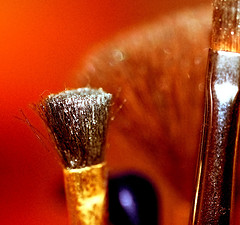
 When you’re going through chemotherapy or radiation, you have to be careful of your skin. Treatment makes it dry and sensitive, which is why we advise you to avoid any harsh ingredients in skin-care products and use only the most gentle formulas.
When you’re going through chemotherapy or radiation, you have to be careful of your skin. Treatment makes it dry and sensitive, which is why we advise you to avoid any harsh ingredients in skin-care products and use only the most gentle formulas.
But what about your makeup? Again, you want to use gentle, sensitive-skin formulas that are free of toxic chemicals, but as you’re perusing your drawer of products, one more thing you may want to consider is your makeup brushes. Where did you get them? What kind are they? When was the last time you washed them?
The most important thing about your brushes is that they’re soft. And believe it or not, that could mean either natural or synthetic bristles. Let’s look at the difference.
Natural bristles are made with animal hair that comes from goats, ponies, badgers, or squirrels. (If you’re allergic to animal hair, choose synthetic brushes.) But just because it’s animal hair doesn’t mean it’s quality-it all depends on how it’s treated and connected to the handle. Natural bristles are usually hand-shaped and glued, and range from feeling really soft to rough and scratchy. (Some goats have softer hair than others, and it also depends on how the hair is processed.) They also may shed, but they usually hold powder better than synthetic bristles and distribute it more evenly, which is why they’re often preferred by professionals.
“Squirrel hair has some of the softest bristles,” says makeup writer Teresa Hall. “Good sable makeup brushes, taken care of properly, will last the longest.”
Synthetic brushes are made using man-made materials, and can also range from rough-feeling to silky soft. You can tell their synthetic by their shinier appearance. The biggest advantage is they typically don’t shed, and glide over your face easily, which can be better for dry, flaky skin. High-quality synthetic brushes can be just as nice as natural ones, so if you’re concerned about animal rights and want to avoid natural-hair, you can still find quality brushes. However, watch out for low-quality synthetic brushes, as they can stiffen with use.
“I have very sensitive skin,” says Moo. “The only natural hair brushes that don’t bother my skin are high-quality squirrel and Italian Badger hair brushes. Lumiere’s synthetics are even softer.”
To test for shedding, run your fingers through the hair, flip the bristles back and forth, then brush the brush on your hand like you would when applying makeup. After a few times if the hair is coming off, move along and test another one. If the bristles feel stiff or prickly, don’t buy it, as it will only get worse.
If both natural and synthetic brushes can be quality tools, how do you choose? Look for a trustworthy brand. Jane Iredale has a reputation for making products that are good for sensitive skin, so we’d recommend you try her brushes, which are all hand-tied. Users rave about the softness of Lumeire brushes, and Pristine Planet has some great animal-free options. Taklon makeup brushes (a synthetic material) are reputed to be best for applying cream or liquid makeup, as they hold onto the makeup and distribute it evenly. Some Taklon brushes have anti-bacterial benefits, which can be helpful while you’re going through treatment. (Natural bristles can trap powders and chemicals in makeup.)
Finally, don’t forget to clean your brushes often (at least once a week), particularly while you’re going through treatment. Use warm water and a little toxin-free shampoo, swirl in a cup, use your fingers to clean the hairs gently in the direction of the hair, then run under clean water until the water runs clear. Air dry on a paper towel with the brush hanging over the sink overnight. Do not dry the brushes upright (with the hair pointing upward) as moisture and particles can collect into the base of the brush and cause the hair to eventually fan out or shed, or even loosen the handle.
Do you have a favorite makeup brush for sensitive skin? Let us know!
Photo courtesy of annia316 via Flickr.com.

